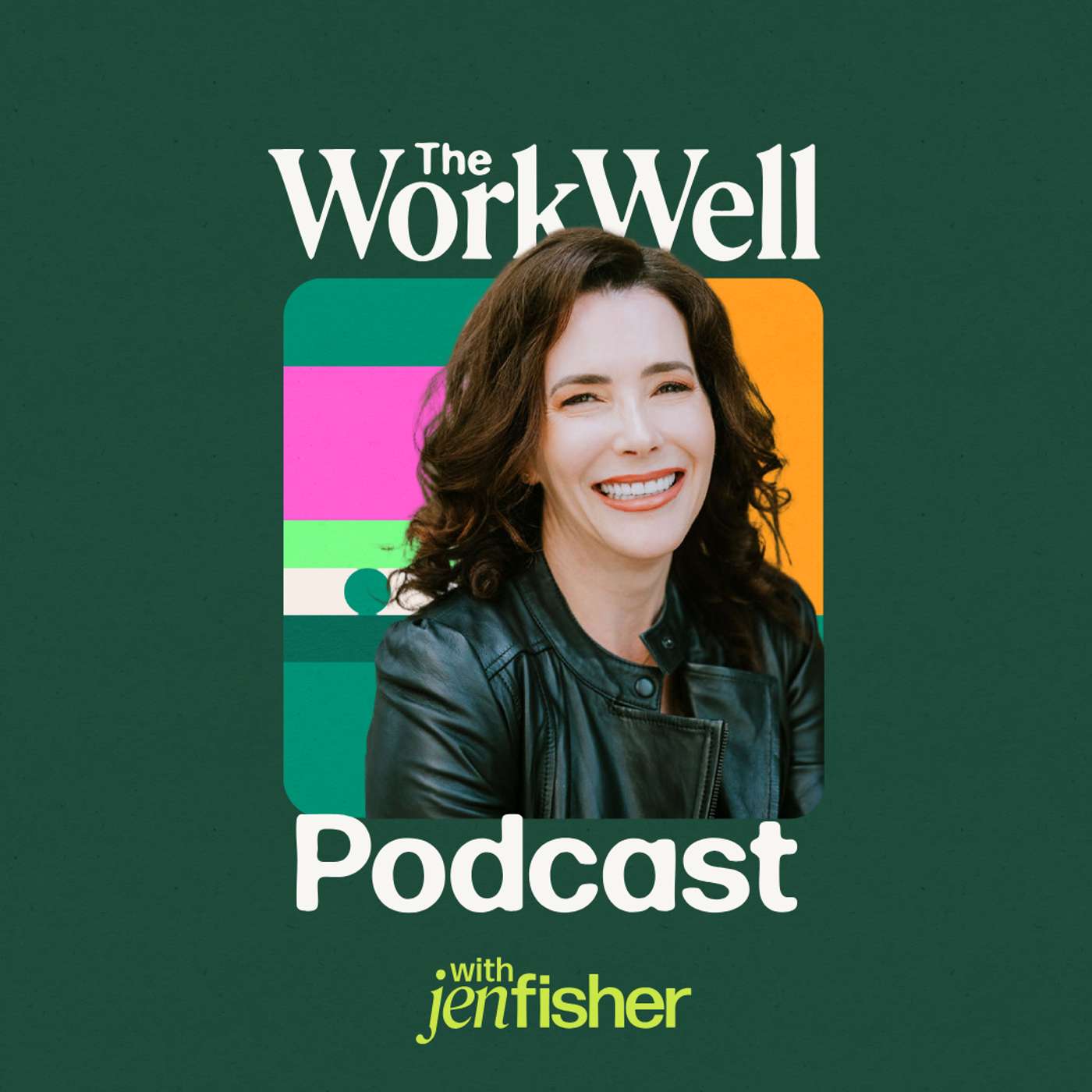
The Balanced Badass Podcast®
The Balanced Badass Podcast® is the show for high-achieving professionals who want to prevent burnout, master work-life balance, and stay badass without losing their sanity.
Each episode, we’re not just tackling your overflowing calendar and keeping your household on track; we’re getting into burnout prevention and recovery strategies so that you have time to breathe, laugh, and savor that much-needed glass of wine at the end of the day.
Think of this podcast as your regular dose of practical advice, a touch of humor, and a little tough love, like catching up with a friend who just gets it. Whether you’re navigating burnout, balancing meetings and meal prep, or carving out moments of self-care, this is the space where we figure it out together.
Disclaimer: My content is for educational purposes only and not a substitute for professional medical or mental health advice. For serious concerns, please consult a qualified provider.
The Balanced Badass Podcast®
Overloaded, Overlooked, and Out of F*cks
Welcome back!
This episode gets into the concept of Effort-Reward Imbalance to explain why you can be working hard and still feel stuck. If you're tired of useless advice and want to get to the root of your burnout, this episode is for you.
We discuss the impact of constant emotional and mental labor, the cognitive load that drains your energy, and how to repair trust in yourself and your environment.
It's time to stop the cycle of stress and start feeling in control again.
Check out the detailed show notes (https://tarakermiet.com/podcast/) and leave your thoughts or questions about today's topic.
00:00 Welcome Back: Overcoming Challenges
00:39 The Struggle of Working Hard and Getting Nowhere
01:57 Understanding Effort-Reward Imbalance
04:17 The Impact of Cognitive Load
06:43 Burnout to Futility: The Breaking Point
09:23 Rebuilding Trust and Finding Relief
10:47 Practical Steps to Reclaim Your Energy
13:40 Final Thoughts and Encouragement
Got something to say? Text me!
-----
I’m Tara Kermiet, a leadership coach, burnout strategist, and host of The Balanced Badass Podcast®. I help high-achievers and corporate leaders design careers that are successful and sustainable.
Here, you’ll find tactical tools, leadership lessons, and burnout education that just makes sense.
👉 Start by taking my free Burnout Drivers Mini Assessment
😍 Join my community on Instagram (@TaraKermiet) and/or TikTok (@TaraKermiet) so we can stay connected!
🎤 Got a question, a topic you want me to cover, or just want to share your thoughts? I'd love to hear from you! Send me a DM or email.
Stay balanced, stay badass, and make good choices!
Disclaimer: My content is for educational purposes only and not a substitute for professional medical or mental health advice. For serious concerns, please consult a qualified provider.
[00:00:00] Hey. Hey. It's been a minute, huh? If you're new here, welcome. And if you've been around for a while, you probably noticed I took a little sabbatical. I had knee surgery a few months ago, and let me just say nothing quite humbles you like needing help. Putting your pants on recovery has been a whole thing, and I may talk about it in another episode a little bit more, but for now I'm just really glad to be back behind the mic.
I've got my coffee to the side and I'm finally able to sit for longer than 20 minutes without regretting every single life choice. So let's get into it. If you're feeling like you've been working your ass off and still getting nowhere, this one's gonna be for you. I mean, you've been really working, giving everything you've got, trying to be the dependable one, the one who shows up, the one who doesn't drop balls, and still you're stuck, spinning, [00:01:00] burnt out, but pretending that you're fine, you're quiet, quitting maybe, or maybe your rage working, or you could be lying awake at night wondering if it's just you.
If you're listening to this, I'm gonna guess that you're tired of the bullshit advice, the just set better boundaries or try yoga or drink more water. Kind of fixes like, cool, love that for me. But that's not the problem here. The problem is you are doing everything right and still feel behind. Still feel like you are not doing enough.
Still feel like the reward for being the most capable person in the room is just more responsibility and more work. You keep showing up and the finish line keeps moving. You are praised when it's convenient, but overlooked when it counts. And part of you is wondering if this is just how it's gonna be forever.
Let's name the actual thing happening here. [00:02:00] This is called Effort Reward Imbalance. It's a framework developed by a German researcher named Johannes Siegrist. I probably butchered his name, but he was onto something that corporate culture still hasn't figured out. The idea is that when you consistently give high effort and the rewards don't match your body and brain treat that gap like a threat and effort isn't just physical work here, it's being the one who always steps up.
Smoothing over those awkward team dynamics. Mentally preparing for worst case scenarios in the middle of the night. It's emotional labor, mental labor, reputation management, and rewards don't just mean money or compensation, although that is a big one. We're talking about recognition, autonomy, respect, psychological safety, the ability to step away without something blowing up.
A sense of meaning or growth. And when those rewards are missing or [00:03:00] super inconsistent, your nervous system starts thinking you are in trouble, that you are not safe, because in nature, expending energy without return is dangerous. It's unsustainable. It's what happens right before you starve. And your body knows that it doesn't care that your job is on zoom and not in the wild.
It reads the threat the same way. So you shift into hypervigilance, you start bracing, maybe hustling harder, probably over preparing, checking everything a thousand times just in case you keep giving, hoping that something will finally click, that someone will finally notice that if you just hang on a little longer, then it'll get better.
But it doesn't. So then you go from being a little stressed to your system being on fire 24 7 in what feels like the blink of an eye. And the more conscientious, reliable, [00:04:00] empathetic, or achievement oriented you are, the more at risk you are. Because people like us don't just try harder, we stay longer. We over function, we absorb the dysfunction so others don't have to feel it.
And that brings me to cognitive load, which is basically the mental bandwidth it takes to function. And most of us are way over capacity with this. It's not just about the actual work, it's all that other shit that's going on under the surface, like reading between the lines of every email.
Navigating vague expectations and unspoken rules. Keeping track of 45 open loops in your brain because nobody else is managing the damn process while also trying to figure out what the hell to have for dinner tonight. That's the full-time job on top of your actual full-time job. It's no wonder you can't think straight.
Goodbye, focus. [00:05:00] Goodbye creativity. Goodbye executive function. Goodbye memory and hello, constant brain fog, emotional outbursts, and wondering why the hell everything is harder than it should be. This is why you can't make simple decisions, why you find yourself zoning out in the middle of meetings or forgetting why you walked into the kitchen.
Your mental load is at capacity, and then we keep piling it on. Oh, can you just take a quick look at this? We need this by the end of the day. Let's hop on a call. Can you be the team lead on this too? Did you sign Sam up for soccer camp? It's like, get out of my inbox, Cheryl. I'm barely keeping it together.
And just like physical effort without reward is a threat to your nervous system. Mental effort without support is a threat to your cognitive system. And what's crazy is that you can be sitting at your desk and burning through your mental [00:06:00] bandwidth like you just ran a marathon. Because you're constantly flipping between roles, solving problems in your head, buffering against potential fallout and managing everyone else's expectations.
It's exhausting, but it's not like you can point to what wore you out. You didn't go out and dig a ditch. You weren't on your feet for 10 hours, but yet you feel depleted because your cognitive load has been at max capacity since the time you woke up and it never let up.
And eventually your brain stops trying to keep up. There's a point where your system looks around and goes, alright, well we've done everything and nothing changes. So what the hell's the point? That's the shift from burnout to futility. Like, you know, when you've been going full speed for weeks or even months and one day you just kind of hit a wall.
You're not even sure really what triggered it, like nothing catastrophic [00:07:00] happened, but suddenly everything feels pointless. You are sitting at your desk or in a meeting or opening your laptop, and then it hits you like a ton of bricks. I don't care. I can't care. Not even a little. You're staring at a spreadsheet or a slide deck.
Or your inbox and you're thinking, what the actual hell are we doing here? That's what I'm talking about. Your system can't sustain the performance anymore, so it literally pulls the emergency break. It numbs you out, it detaches you, it distances you from the stress. You start to feel like a shell of yourself.
You go emotionally offline. Your body is trying to protect you from further depletion, further disappointment and further harm. This is what we call protective detachment. It's your [00:08:00] mind and body saying they're not going to let you keep showing up in spaces that only take from you, not unless something changes, and that sounds noble in theory.
But it is quite terrifying when you're living it, especially if you are someone who used to care deeply. Someone who found meaning in your work. Someone who felt a sense of purpose in being the go-to the glue, the one who could always be counted on. Suddenly the thing that gave you identity feels empty.
The energy that once fueled you is gone. The pride that you took in being reliable and capable is now replaced with numbness, guilt, confusion, and when this sets in, you start turning on yourself. You start wondering if you've become flaky or unmotivated or broken,
but it's a completely logical, intelligent human response [00:09:00] to the emotional math not adding up for way too long. You gave, you adapted, you tried, and the system didn't meet you halfway. It just kept taking. That's the loop of learned futility. It starts with stress, then turns into depletion, then disconnection.
But here's the thing I need you to hear before we go any further. That loop is breakable. It's not easy and it's not instant, and it's not gonna happen just because you listened to this podcast and had a little aha moment. But now that you've named it, you can start figuring out what to do with it. I'll be honest, and you know this, there's no one size fits all recovery plan for anything.
But there is a pattern that I've seen over and over again that starts to gently shift this dynamic we've been talking about, and it begins with this, you stop [00:10:00] trying to fix the system before you fix the story. Now I'm gonna say that again before you go changing jobs, building an entirely new morning routine.
Or rewriting your five year plan, you've gotta rebuild because when you're in that loop of learned futility, what you're really dealing with is a breakdown in trust. You've stopped trusting that your effort leads anywhere. You've stopped trusting yourself to follow through, and you've stopped trusting the systems around you to support you.
So we're not starting with some big rebrand of your entire career. We're starting with restoring trust through tiny, doable, grounded moves that remind your system that you get to choose again. So let me walk you through a few things that might help you start that process. First, you've got a name. What's draining you?
I'm not talking about the obvious stuff, like work is busy or you're tired. No, I mean, what you're [00:11:00] carrying that no one sees. Because I can guarantee you the things draining you the most are probably invisible to everyone around you. I'm talking about having to read between the lines every time your boss gives you feedback, or being the unofficial team therapist or maybe thinking five steps ahead, so your kid's soccer schedule doesn't blow up your entire week.
Maybe you're pre-draft every possible version of a reply in your head so you don't come off too aggressive or too passive, or too emotional or too cold. This is where your energy is leaking. So step one, call it out. Naming it gives you a place to start. Then look for one place where you can shift the equation.
Where is one place where the effort is high but the return is low? Maybe it's that weekly huddle that's a waste of time, but somehow always ends up on your calendar. Maybe it's the coworker who constantly pings you for [00:12:00] help, but never reciprocates when you ask for it.
Maybe it's the extra polish you keep putting into deliverables that no one even reads that closely. What would it look like to give 5% less there? I'm not saying to stop caring. I'm saying stop bleeding your energy into things that don't give anything back. Even a small recalibration can help your nervous system and that matters more than you think because then you can start noticing progress that you can feel not just tasks completed or metrics hit, but those moments where something inside you unclenches and like releases.
It might look like saying no and not spiraling afterward. Or asking a clarifying question, instead of assuming that it's on you to figure it out alone, or not being the first one to respond to your colleague's question in Slack, those are wins and they start to rebuild the connection between your effort [00:13:00] and your experience.
They remind you that what you do can lead to relief, to peace and to space, and that's the antidote to futility. And if all of that still feels like too much, that's okay. Then maybe the starting point is even smaller. Maybe it's just letting yourself name the fact that something isn't working, that you don't wanna keep doing it this way, that you're just plumb tired.
You don't need to have a whole reinvention plan, and you don't need to have it all figured out. You just need a crack in the narrative that says this isn't working anymore, and that maybe just maybe something else is possible.
So take what you need from this episode this week and let the rest just sit. I'm glad to be back behind the mic with you and I'll catch you again in next week's episode.
Podcasts we love
Check out these other fine podcasts recommended by us, not an algorithm.

Happier with Gretchen Rubin
Gretchen Rubin / The Onward Project
The Gratitude Attitude Podcast
thegratitudeattitudepodcast
Before Breakfast
iHeartPodcasts
A Bit of Optimism
Simon Sinek
Oprah's Super Soul
Oprah
Stuff You Should Know
iHeartPodcasts
Unlocking Us with Brené Brown
Vox Media Podcast Network
We Can Do Hard Things
Treat Media and Glennon Doyle
Take Out Therapy: End Overthinking & Overwhelm for Empathic High Achievers
Rebecca Hunter, MSW
FRIED. The Burnout Podcast
Cait Donovan, Top Burnout Expert for Corporate and Nonprofit Organizations
